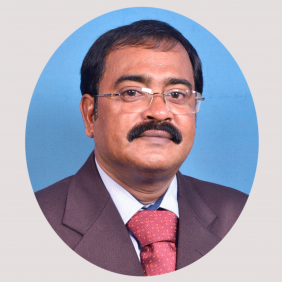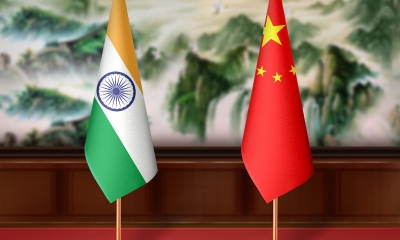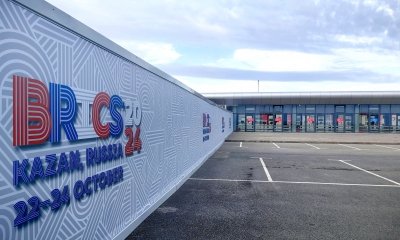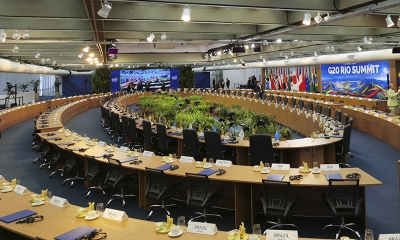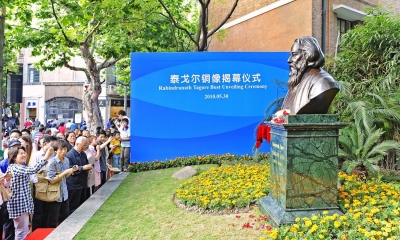BRICS Cooperation Ushers in a Better Future for Global Development
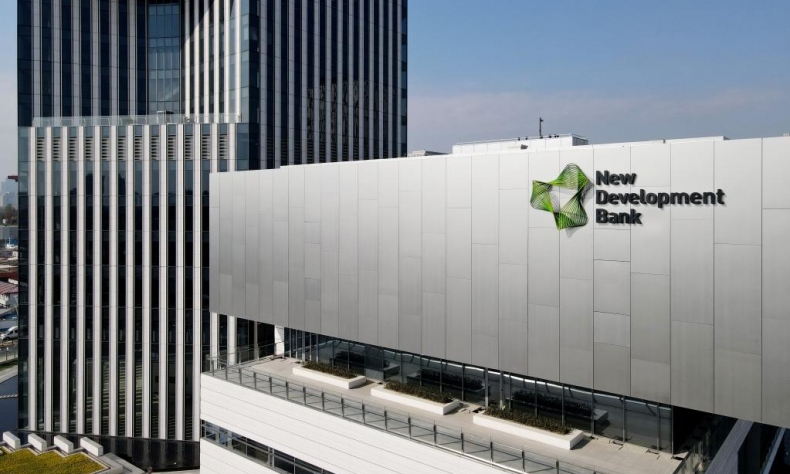
The 14th BRICS Summit is of great importance in jointly upholding international fairness and justice, revitalizing global development, and promoting the building of a community with a shared future for mankind.
Amid simmering geo-political tensions, the 14th annual summit of the five-nation grouping BRICS that includes Brazil, Russia, India, China and South Africa and related high-level meetings- BRICS Business Forum Opening Ceremony and High-level Dialogue on Global Development, hosted by China via virtual conference on June 22-24, have emphasized that efforts must be made to expand “BRICS Plus” cooperation so that the whole world can enjoy sustainable development.
As the host country, which vested with the right to set the agenda for the summit, China had chosen “Foster High-quality BRICS Partnership, Usher in a New Era for Global Development” as the theme for this year’s Leaders’ Summit that mirrors China’s commitment towards building a “community with a shared future for mankind” while accelerating BRICS’ role in global governance.
The 14th BRICS Summit charted the course for the future development of BRICS mechanism, identified the pathway for upgrading BRICS cooperation, and broadened the prospects for BRICS to play a greater role and make a bigger contribution in international affairs.
BRICS Business Forum adds new impetus to cooperation
Over the past 16 years since its establishment, BRICS has become an all-round, multi-level framework, upholding multilateralism and win-win cooperation. Political leaders of BRICS underscored the importance of solidarity and openness at a time when the world is facing drastic changes “unseen in a century” and witnessing “major setbacks” in development.
Speaking at the opening ceremony of the BRICS Business Forum, an important side-event of the BRICS summit, Chinese President Xi Jinping called on leaders of BRICS countries to present a united opposition front against protectionism and new barriers in global trade. He reinforced his message asking all countries to not flinch away from risks, rise up to challenges and forge ahead toward the goal of building a community with a shared future for mankind. China’s commitment to opening-up is once again reflected in Xi’s speech: “China will continue to pursue opening-up against higher standards, develop new systems for a higher-standard open economy, and continue to foster a market- and law-based and internationalized business environment.”
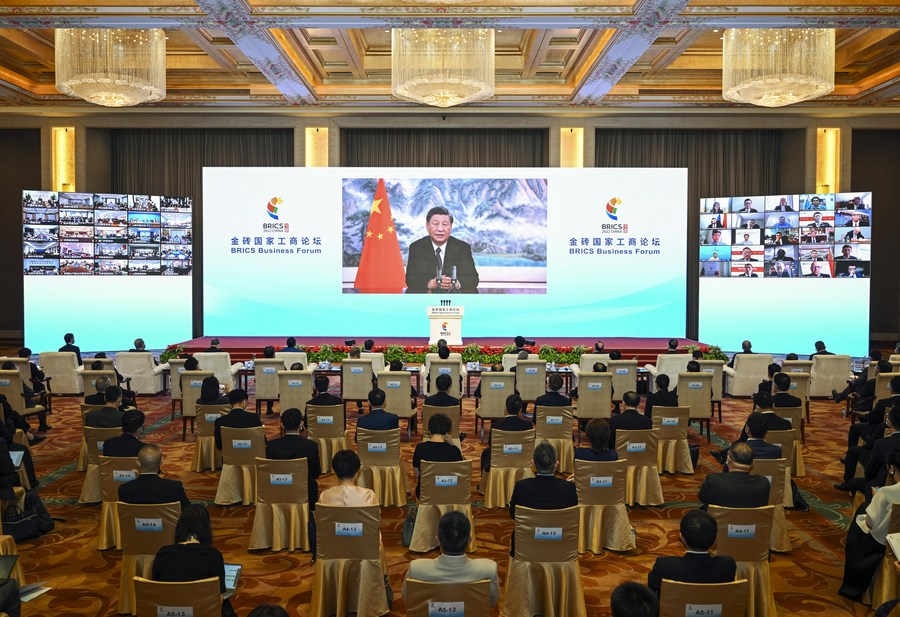
Meanwhile, Prime Minister Modi said BRICS was set up with the belief that this group of emerging economies can evolve as an engine of global growth. He focused on the importance of BRICS grouping in the post-COVID global economic recovery.
The BRICS leaders praised the achievements of the BRICS Business Council and the New Development Bank (NDB). Officially opened in 2015, the Shanghai-headquartered NDB has made headway on many projects across all the five-member states. It had approved more than 80 projects in member countries by May 2021, with a total portfolio of some 30 billion U.S. dollars.
It’s worth noting that the NDB has opened its regional office at the Gujarat International Finance Tec-City (GIFT City) in India to cater to infrastructure and sustainable development needs of the country, as mentioned in the Paragraph 39 of the Beijing Summit Declaration. Needless to say, time will tell that one day the NDB will make the World Bank superfluous.
Ukraine tops agenda at Beijing BRICS Summit
The Beijing BRICS Summit assumed a high degree of significance in the context of the prolonged Russia-Ukraine military conflict causing deaths and destruction, global economic inflation due to the COVID-19 pandemic and other global uncertainties including food crisis, terrorism and climate change. Right after the Russian launched “special military operation” in Ukraine on February 24, the United States and its Western allies have taken actions to isolate Russia from the global economic order.
So far, three of BRICS members – China, India and South Africa – have abstained from voting on the U.S.-backed Ukraine-related resolutions condemning Russia at the U.N. Security Council and Human Rights Council. In his address, President Xi called on the BRICS countries to “abandon Cold War mentality and bloc confrontation and oppose unilateral sanctions and the abuse of sanctions” to “make the world a more stable place” in order to build a global community of security for all. Xi’s warning was clearly hinted at the U.S.-led western world’s barrage of sanctions on Russia.
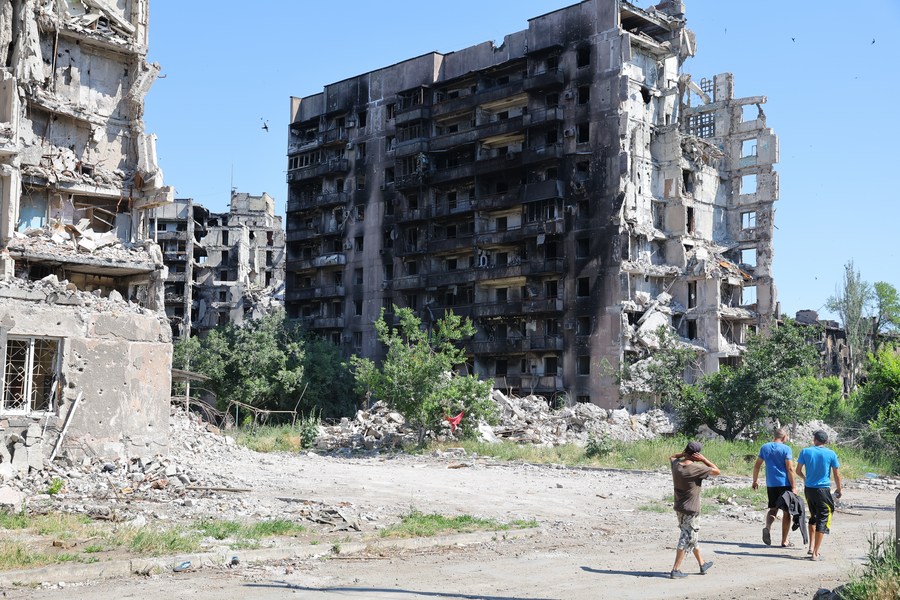
Xi’s voice was noted in the Paragraph 22 of the XIV BRICS Summit Beijing Declaration which deserves highlighting: “We have discussed the situation in Ukraine and recall our national positions as expressed at the appropriate fora, namely the UNSC and UNGA. We support talks between Russia and Ukraine. We have also discussed our concerns over the humanitarian situation in and around Ukraine.”
In the declaration, the BRICS leaders also agreed to provide humanitarian assistance to Ukraine, Afghanistan and other parts of the world “in accordance with the basic principles of humanity, neutrality and impartiality established in UN General Assembly resolution 46/182″.
In addition to the Ukraine crisis, the leaders of the five countries also support a peaceful, secure and stable Afghanistan while emphasizing respect for its sovereignty, independence, territorial integrity, national unity and non-interference in its internal affairs. The BRICS declaration reiterated that terrorism should not be associated with any religion, nationality, civilization or ethnic group.
Working in solidarity for a better post-COVID world
Although the side effects of the COVID-19 pandemic may have come down, noting its impact on the global economy, BRICS leaders promised to enhance BRICS solidarity in order to achieving strong and inclusive growth in a post-pandemic world. As Prime Minister Modi noted, “Our mutual cooperation can make a useful contribution in the global post-Covid recovery.” The five leaders underlined the need for equitable distribution of vaccines and expeditious vaccination to fill the immunization gap globally.
“We support the leading role of the WHO in combating the pandemic, as well as acknowledge initiatives such as the COVAX and the ACT-A. We recognise the importance of the discussions in the WTO on relevant IP waiver proposals as well as capacity building and strengthening local production of vaccines and other health tools, especially in developing countries,” the Beijing Declaration reads.
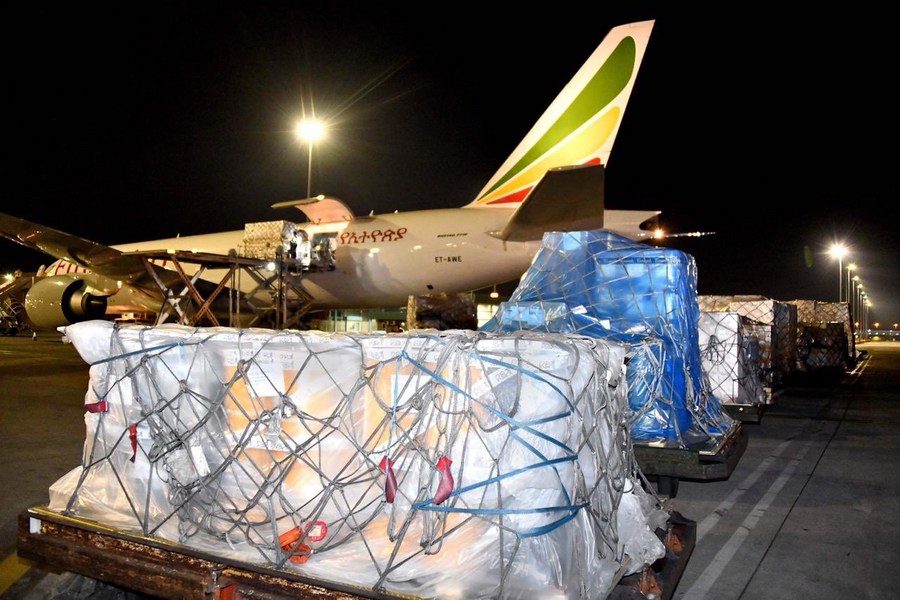
Pursuing common development
President Xi chaired the High-level Dialogue on Global Development under the theme of “Foster a Global Development Partnership for the New Era to Jointly Implement the 2030 Agenda for Sustainable Development” which was attended by leaders of the BRICS countries, the political leaders of major emerging markets and developing countries. The dialogue highlighted China’s development philosophy to promote global prosperity. In his address, Xi criticized that some countries have politicized and marginalized the development issue, built “a small yard with high fences,” imposed maximum sanctions, and stoked division and confrontation.
Calling for an “enabling international environment for development”, Xi warned that “protectionist moves will boomerang; anyone attempting to form exclusive blocs will end up isolating himself; maximum sanctions serve nobody’s interest, and practices of decoupling and supply disruption are neither feasible nor sustainable.”
It should be noted here that amid the growing wave of anti-globalization sentiment and the crises of COVID-19, President Xi put forward the Global Development Initiative (GDI) in September 2021 which aims to re-energize implementation of UN 2030 Agenda for Sustainable Development and build a global community of development.
A list of deliverables composed of 32 measures was released at the High-level Dialogue on Global Development. China’s role in promoting the implementation of the 2030 Agenda is significant. China has vowed to add $1 billion to the $3 billion already committed to the South-South Cooperation Assistance Fund and upgrade it to one that also includes global development missions.
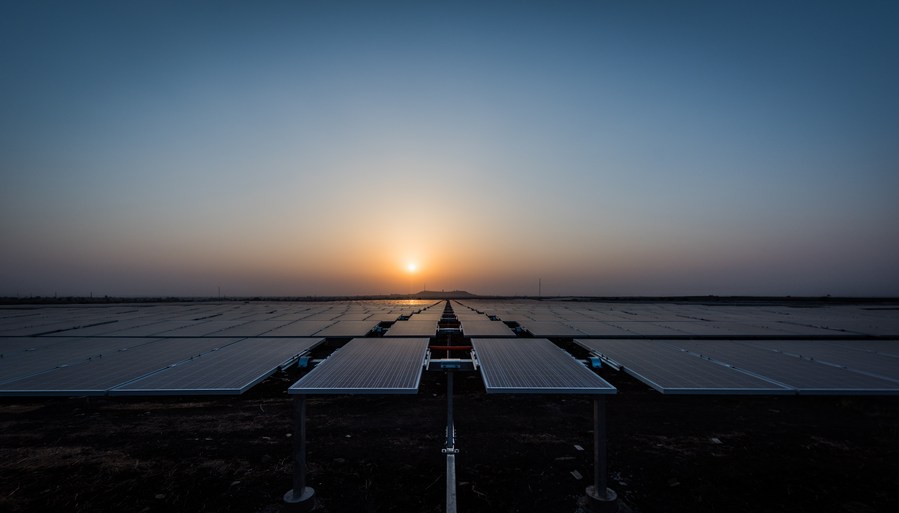
BRICS promotes interests of developing countries
Over the years, China has played an active role in guiding cooperation among the BRICS nations to promote multilateralism in the face of global challenges and has pushed for the bloc’s cooperation to benefit more emerging economies and developing countries. In his speeches, President Xi reiterated that China will work with all peace-loving countries to uphold justice, safeguard peace and promote the building of a global community of security for all.
The 14th BRICS Summit is of great importance in jointly upholding international fairness and justice, revitalizing global development, and promoting the building of a community with a shared future for mankind. The development of BRICS is not intended to “move the cheese of anyone but to make the pie of the global economy bigger,” to quote from President Xi’s remarks at the 2017 Xiamen BRICS Summit.
BRICS cooperation not only belongs to the five countries, but also belongs to all emerging markets and developing countries. It is hoped that the BRICS countries should expand their circle of friends through BRICS cooperation on the basis of frankness, sincerity and harmonization of the interests of all with an aim to modernize the global governance architecture so that the overall interests and well-being of developing countries will be enhanced.
The article reflects the author’s opinions, and not necessarily the views of China Focus.
 Facebook
Facebook
 Twitter
Twitter
 Linkedin
Linkedin
 Google +
Google +



